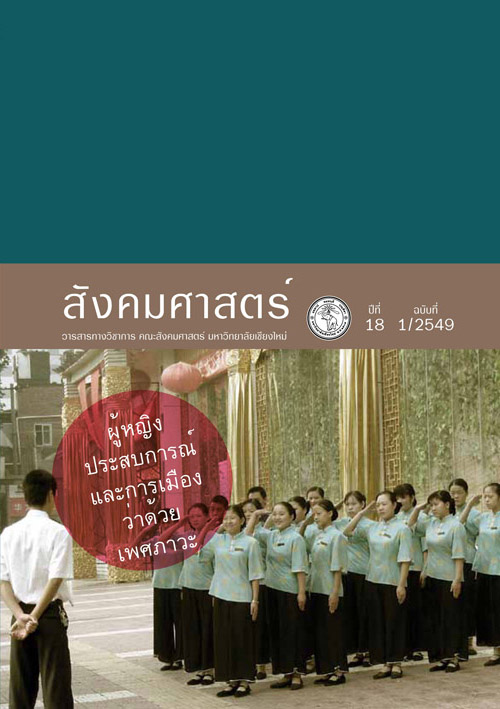ชาติพันธุ์นิพนธ์แนวสตรีนิยม:การท้าทายกระบวนทัศน์ปฏิฐานนิยม
Main Article Content
Abstract
สาระสำคัญของบทความนี้มุ่งอธิบายวิธีคิดวิทยาที่นักมานุษยวิทยาแนวสตรีนิยมยุคหลังทฤษฎีโครงสร้างนิยม ใช้นำทางในการผลิตองค์ความรู้เกี่ยวกับผู้หญิงโดยพยายามทำให้มีผู้หญิงกลายเป็นศูนย์กลางของความรู้เกี่ยวกับผู้หญิงเอง ซึ่งแน่นอนว่าการหันมาทำความเข้าใจและศึกษาเรื่องราวเกี่ยวกับผู้หญิงใหม่ภายใต้วิธีวิทยาแนวใหม่ อาจทำให้เราจำเป็นต้องก้าวไปไกลถึงขั้นต้องท้าทายหรือปล่อยวางวิธีคิดวิทยาแบบเดิมๆ ที่ถูกครอบงำโดยกระบวนทัศน์ปฏิฐานนิยม ดังนั้นสไตล์การเขียนงานชาติพันธุ์นิพนธ์แนวสตรีนิยมยุคหลังสมัยใหม่นิยม จึงพยายามขุดคุ้ยให้เห็นว่าภายใต้วิธีการสร้างความรู้แบบที่เราคุ้นชินกันมา มักมีอุดมการณ์สังคมที่ยึดผู้ชายเป็นศูนย์กลางชี้นำอยู่เสมอ ส่งผลให้ผู้หญิงและความรู้ของผู้หญิงกลายเป็นความรู้ชายขอบ ไร้พลังอำนาจ มีสถานะแปลกแยก และเป็นอื่นตลอดมาท้ายสุดบทความนี้พยายามที่จะบอกว่า ด้วยการตระหนักถึงหลุมพรางของวิธีการสร้างความรู้เกี่ยวกับผู้หญิงแบบเดิมๆ เท่านั้น นักวิจัยแนวสตรีนิยมจึงจะสามารถสร้างงานชาติพันธุ์นิพนธ์ที่มีประโยชน์ต่อการปรับเปลี่ยนสถานภาพของผู้หญิง และความรู้ของผู้หญิง ให้ย้ายจากชายขอบมาอยู่ที่ศูนย์กลาง และเคียงบ่าเคียงไหล่กับผู้ชายและความรู้ของผู้ชายได้
Article Details
All written articles published on Journal of Social Sciences is its author’s opinion which is not belonged to Faculty of Social Sciences, Chiang Mai University or is not in a responsibility of the journal’s editorial committee’s members.
References
Bloom, L. R. (1988) Under the Sign of Hope: Feminist Methodology and Narrative Interpretation. Albany, N.Y.: State University of New York Press.
Clifford, James and George Marcus (1986) Writing Culture : The Poetics and Politics of Ethnography. Berkeley, University of California Press.
Harding, Sandra (1998) Is Science Multicultural?: Postcolonialism, Feminism, and Epistemology. Bloomington and Indianapolis: Indiana University Press.
Marjorie, Muecke (1994) On the Evaluation of Ethnographies. In Critical Issues in Qualitative Research Methods. Janice M. Morse edited. Thousand Oaks: Sage Publication.
Mohanty, C. T., A. Russo, et al. (1991) Third World Women and the Politics of Feminism. Bloomington: Indiana University Press.
Scott, Joan. (1998) Experience. In Women, autobiography, theory: A reader. Sidonie Smith and Julia Watson, eds., Wisconsin: The University of Wisconsin Press.


